Monday Feb 23, 2026
Monday Feb 23, 2026
Wednesday, 4 September 2019 00:00 - - {{hitsCtrl.values.hits}}
As another Presidential Election draws near, it is customary for candidates and their economic spokespersons to roll out unrealistic and outlandish promises to the electorate in a bid to win votes without addressing the serious issues we are faced with. In a country where the political leadership
 |
Milinda Moragoda
|
once promised to bring rice from the moon if necessary, it would seem that Sri Lankans have heard it all.
The country has now run out of options. We can no longer afford to take matters lightly. It is therefore essential that presidential candidates and their economic experts lay out their proposed economic policies and be held accountable for their election pledges and commitments. Civil society, the media, the trade chambers and even the Elections Commission have an important role to play in monitoring this aspect. Since social media will play a key role in this election campaign, it is now much easier for all Sri Lankans to be engaged and alert.
Against this backdrop, there are seven economic truths that any serious contender for the presidency must address if we are to avoid economic catastrophe.
The Sri Lankan Government spends twice as much as it earns in revenues. Therefore every year, the Government borrows both domestically and internationally to meet approximately half of its expenditure. 90% of Government revenues are required to be spent on servicing the national debt.
It is estimated that Sri Lanka requires only 750,000 to 800,000 government employees to provide the services required by the public. However, the Sri Lankan Government employs over 1.5 million people. This is one of the highest public servant to population ratios in the world. In addition, to ease the employment pressures, the government on a regular basis absorbs the unemployed graduates, of local universities. Further, there are now over 600,000 retired Government servants who receive pensions.
Sri Lanka imports around twice as much as it exports.
SriLankan Airlines, the Ceylon Petroleum Corporation, and the Ceylon Electricity Board have become dinosaurs and represent a serious drain on public finances. If left unchecked, these inefficient and costly enterprises can potentially cause the economy to collapse. Vested interests have long dominated these institutions and no political leader has had the courage to seriously restructure or reform them.
Although Sri Lanka is considered to be an upper middle-income country, two million families or nearly 40% of the population is on the Samurdhi welfare program. A new generation of political leaders must have the courage to seriously reexamine and modernise Sri Lanka’s welfare system.
25% of the Sri Lankan work force is employed in agriculture. Experts say that in an economy such as ours, agricultural employment should be 15%.To manage this transition, Sri Lankan leaders will have to create higher-wage job opportunities in other sectors while bringing efficiencies into the farming sector.
The above are the seven key cold economic truths; but these are just the start. In conclusion, it is important that citizens demand that any candidate seeking the highest office of this country lay out their policies in their manifestos, including their proposed solutions to the dire economic challenges our country is now facing. Any person wishing to responsibly lead this country must have the political courage and moral strength to present clear proposals and policies that will address at the bare minimum the above issues.
Populist rhetoric and political theatrics place present and future Sri Lankans at peril. Sri Lanka stands at the edge of an economic precipice. It is up to the Sri Lankan citizenry to stand firm and hold politicians accountable on these pressing issues.